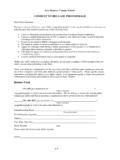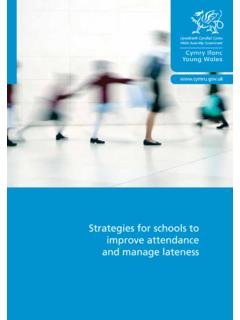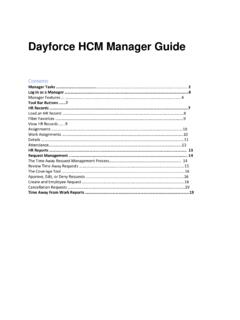Transcription of STUDENT ATTENDANCE General Requirements
1 Policy: 8212. STUDENT ATTENDANCE . General Requirements The New Hanover County Board of Education (Board) believes that regular and punctual ATTENDANCE at school is imperative for educational success. Students are expected to be in school each day unless ill or unable to attend due to an unavoidable reason. The Board further believes that there is no substitute for the uninterrupted personal contact between teachers and students in the classroom environment where learning experiences are carefully planned and taught by teachers. The primary responsibility for school ATTENDANCE rests with students and parents.
2 Schools, however, have the responsibility for properly recording absenteeism and tardiness, notifying parents when needed, and discouraging excessive absences in accordance with state law. North Carolina General Statute (NCGS) 115C-307 (f). The Board seeks the full cooperation from parents in promoting good ATTENDANCE and punctuality, in particular and strongly encourages the following: When possible medical and dental appointments should be scheduled after school hours;. and Family vacations should be taken during school vacation and recess periods. Parent/guardians should inform the STUDENT 's teacher and/or designated personnel of the reason for each absence.
3 The process shall be outlined in each school's STUDENT handbook. No STUDENT will be excused from regular schoolwork to take private lessons in music, art, dance, or any other area without prior approval of the Superintendent's office. The objectives of the New Hanover County Schools' ATTENDANCE policy are to: Encourage maximum class ATTENDANCE ;. Encourage students to apply their time and attention toward obtaining the maximum benefits for their education;. Place the primary responsibility for school ATTENDANCE upon students and parents;. Provide teachers, counselors, and administrators more time to accomplish their primary responsibilities as educators.
4 Eliminate excessive absenteeism;. Provide alternative consequences for excessive absences; and Reward good and perfect ATTENDANCE . 1 of 6. Policy: 8212. Lawful, Excused Absences Pursuant to state law NCGS 115C-378 and the rules and regulations of the N. C. Department of Public Instruction, School ATTENDANCE and STUDENT Accounting Manual, the following shall constitute a lawful excused absence, provided satisfactory evidence is given to the appropriate school official: Illness or injury: An illness or injury which prevents the STUDENT from being physically able to attend school. Quarantine: When isolation of the STUDENT is ordered by the local health officers or the State Board of Health.
5 Death in the immediate family of the STUDENT : Defined to include, but not necessarily limited to, grandparents, parents, brothers, and sisters. Medical or dental appointments: When the absence results from a medical or dental appointment of a STUDENT . Court or administrative proceedings: ATTENDANCE at the proceedings of a court or an administrative tribunal if the STUDENT is party to the action or under subpoena as a witness. Religious observances: When the tenets of a religion to which a students and/or parents/guardians adhere require or suggest the observance of a religious event unless the religious observance or the cumulative effect of the religious observance is of such duration as to interfere with the education of the STUDENT .
6 More than two (2) religious observances require the approval of the Superintendent or designee. Educational opportunity: When the absence clearly is to take advantage of a valid education opportunity, such as travel or experience that supports career and college ready skills. All requests for excused educational opportunities should be submitted, in writing, in advance of the opportunity. The request should include the learning objective of the opportunity, and how the objective links to coursework or educational development of the STUDENT . Such experiences may include: Cultural exposure or experiences with clear alignment to course content standards for elementary and middle school levels; and college tours, cultural exposure or experiences with clear alignment to course content standards.
7 Approval for such an absence must be granted prior to the absence by the principal. o The Board considers juniors and/or seniors present for two (2) post-secondary college visits. For any additional college visits, juniors and/or seniors will be considered excused and absent and should be marked as such. Absences related to deployment activities: A STUDENT whose parent/ legal guardian is an active duty member of the uniformed services and has been called to duty for, is on leave from, or immediately returned from deployment to a combat zone or combat support posting for the purpose of visiting said parent/ legal guardian.
8 (NCGS , current School ATTENDANCE and STUDENT Accounting Manual Article V (E). 2 of 6. Policy: 8212. Child Care: Absences due to the illness or medical appointment during school hours of a child of whom the STUDENT is the custodial parent are to be coded excused (lawful). (NCGS ). Unlawful Absences For students who are entitled to attend public school and who have enrolled in a public school, unlawful absence is defined as: A STUDENT 's willful absence from school with or without the knowledge of the parent/guardian; or A STUDENT 's absence from school for any reason other than those listed in the current School ATTENDANCE and STUDENT Accounting Manual Chapter 2, Section , under Lawful Absences.)
9 When students are not permitted to attend school because they lack proper immunization. (see NCGS 130A-155). Make Up Days for At-Risk Students Identified At-Risk students who miss days or classes may be allowed to make them up during non-school hours. Time must be made up on an hour-for-hour/day-for-day basis with participation limited to those students who fit an LEA's criteria for identification as an At-Risk STUDENT (see Policy 7150). Notification of Excessive Absences for Elementary, Middle and High School ATTENDANCE must be taken each day of the school year. In order to be considered in ATTENDANCE , a STUDENT (except for hospital/homebound or staggered kindergarten) must be present in the school for the school day or at a place other than the school with the approval of the appropriate school official for the purpose of attending an authorized school activity.
10 Such activities may include field trips, athletic contests, STUDENT conventions, musical festivals, college visits, educational opportunities or any similar approved activity. The principal and staff shall take appropriate action to prevent excessive absences and/or provide counseling for students with a history of excessive absences. Parents must be notified of their STUDENT 's excessive absences, and the teacher and/or counselor shall then work with the STUDENT and the family to analyze the causes and to determine the steps to eliminate the problem. NCGS 115C-378 provides that every parent/guardian or other person in the state having charge or control of a STUDENT between the ages of 7 and 16 years shall cause such STUDENT to attend school continually for a period equal to the time which the public school to which the STUDENT is assigned shall be in session.










